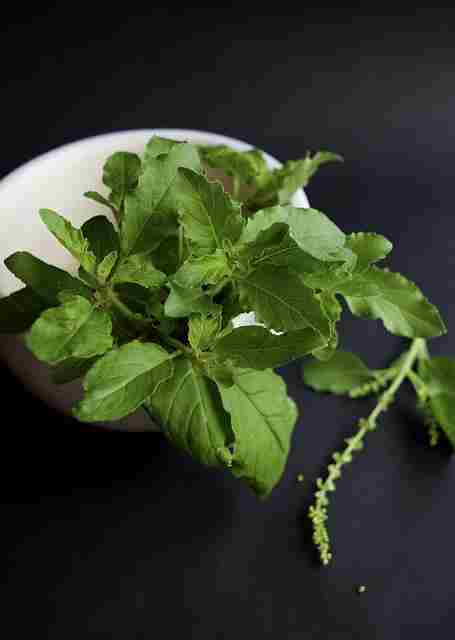Introduction:
Benefits of Tulsi Tulsi also known as Holy Basil, holds a revered place in traditional Ayurvedic medicine and is considered a sacred plant in many cultures. This aromatic herb has been valued for its numerous health benefits for centuries. The logical name of Tulsi is Ocimum sanctum, and it has a place with the Lamiaceae family. This article delves into the extensive range of health advantages that Tulsi offers to human well-being, encompassing its medicinal properties, nutritional content, and cultural significance.
-
Historical Significance and Cultural Importance:
In ancient times, people regarded Tulsi as a symbol of purity and divine protection, and its relationship with healing stretches back to those times. They also used it frequently in Ayurvedic medicine and considered it an essential component of religious rites.
-
Medicinal Properties of Tulsi:
Anti-Inflammatory and Antioxidant Effects:
Tulsi contains essential oils such as eugenol, which possess potent anti-inflammatory and antioxidant properties.
These properties help combat oxidative stress and inflammation in the body, contributing to overall health and disease prevention.
Immune System Booster:
The immunomodulatory effects of Tulsi are well-documented, helping to enhance the body’s natural defense mechanisms.
Regular consumption of Tulsi is believed to strengthen the immune system and protect against infections and diseases.
Adaptogenic Nature:
Tulsi is classified as an adaptogen, meaning it helps the body adapt to stressors and maintain balance.
The adaptogenic properties of Tulsi may contribute to stress reduction and improved resilience to various stressors.
Antimicrobial Properties:
Tulsi exhibits broad-spectrum antimicrobial activity, with the ability to combat bacteria, viruses, and fungi.
This makes Tulsi a valuable ally in preventing and managing infections.
Cardioprotective Effects:
Studies suggest that Tulsi may have a positive impact on heart health by lowering blood pressure and reducing cholesterol levels.
The antioxidant properties of Tulsi contribute to cardiovascular protection by preventing oxidative damage to the heart and blood vessels.
Anti-Diabetic Potential:
Research indicates that Tulsi may help regulate blood sugar levels and improve insulin sensitivity.
These effects make Tulsi a promising natural supplement for individuals with diabetes or those at risk of developing the condition.
Neuro protective Properties:
Compounds found in Tulsi, such as ocimumosides A and B, have demonstrated neuro protective effects.
These properties may have implications in the prevention and management of neuro degenerative disorders.
Vitamins and Minerals:
Tulsi is a rich source of vitamins A and C, both of which are essential for immune function and skin health.
It also contains various minerals, including calcium, magnesium, and potassium, contributing to overall well-being.
Essential Oils:
The essential oils present in Tulsi, such as eugenol, linalool, and cineole, not only contribute to its medicinal properties but also enhance its flavor and aroma.
Flavonoids and Polyphenols:
Tulsi contains flavonoids and polyphenols with antioxidant properties that help neutralize free radicals in the body.
These compounds play a crucial role in preventing cell damage and supporting cellular health.
-
Ways to Incorporate Tulsi into Daily Life:-Health Benefits of Tulsi
Tulsi Tea:
Brewing Tulsi tea is a popular and simple way to enjoy its health benefits. The tea can be made using fresh or dried Tulsi leaves.
Tulsi Infused Water:
Adding fresh Tulsi leaves to water imparts a subtle flavor and allows for easy consumption throughout the day.
Tulsi Supplements:
Tulsi supplements, available in various forms such as capsules or tinctures, provide a convenient way to incorporate Tulsi into a daily health routine.
Culinary Uses:
Fresh Tulsi leaves can be used in cooking to add a unique flavor to dishes. It goes well with a lot of different dishes.
-
Precautions and Potential Side Effects:
While Tulsi is generally considered safe for consumption, certain precautions should be taken:
Allergic Reactions:
People with known sensitivity to plants in the Lamiaceae family, like mint or basil, ought to practice alert.
Pregnancy and Breastfeeding:
Pregnant and breastfeeding women should consult with a healthcare professional before incorporating Tulsi into their routine.
Blood Sugar Levels:
Individuals with diabetes should monitor their blood sugar levels closely, as Tulsi may have hypoglycemic effects.
-
Conclusion:Health Benefits of Tulsi (Holy Basil)
In conclusion, tulsi is an amazing herb that offers a wide range of health advantages. Tulsi continues to be an important herb for boosting general well-being because of its scientifically proven therapeutic qualities as well as its historical and cultural relevance. Tulsi can be taken as a tea, a supplement, or added to food to improve immune system performance, cardiovascular health, stress reduction, and other areas. Adding Tulsi to holistic health practices is still a viable way to improve human health and vitality, even as research reveals more of the herb’s therapeutic potential.Benefits of Tulsi




Average Rating